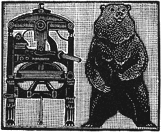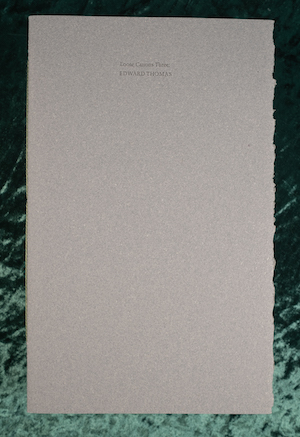| |
||||||||
Books in Print

Wood engraving by Colin Paynton
(from The Chimes, 1985)
Weathers:
A Selection of Thomas Hardy’s Poems
October 2025
Loose Canons Two:
E A Robinson: Ben Jonson Entertains a Man from Stratford & Other Poems
February 2025
Loose Canons Three:
Edward Thomas: The Child on the Cliffs
April 2025
Loose Canons Four:
Merrill Moore: Blue & Yellow Evening at Ostend
October 2025
Pastoral Elegies
Thomas Gray’s
Elegy written in
a country churchyard
& Oliver Goldsmith’s
The Deserted Village
Spring 2024
|
Click on book cover |
Loose Canons Three:
Edward Thomas: The Child on the Cliffs
The third in an ongoing series of pamphlets celebrating and reintroducing poets and poems unfairly neglected or forgotten
April 2025
Edward Thomas may be the most English of all poets, as English as Frost is American: it is not surprising that Thomas and Frost became very close friends during Frost’s time spent in England from 1912 to 1915. Both men seek and capture the essence of the overlooked. It was Frost who encouraged Thomas to write poetry, after Thomas had spent a lifetime as a writer of travel books, biography, criticism, and reflections on the English countryside, which he loved. Astonishingly, he only began to write poetry in 1914, and all his poems were written in the last three years of his life. He was killed while in active service in Flanders.
His poems have a unique tone and rhythm, connected in many cases with the varieties of English spoken in the countryside in which he spent his life, and the forms in which he casts his poems tend to the condition of the ballad or the English lyric. A few of his poems simply revel in the luxuriance of country place-names, or flowers, or birds, anticipating Auden’s later suggestion that lyric poetry begins with lists: for example the list of ships in the Iliad, Perdita’s catalogue of flowers in The Winter’s Tale, and Milton’s similar list in ‘Lycidas’. But Thomas is a true countryman, and his poems do not romanticize their subjects; indeed they are often chillingly exact in their descriptions, as in ‘Gallows’:
There was a weasel lived in the sun
With all his family,
Till a keeper shot him with his gun
And hung him up on a tree,
Where he swings in the wind and the rain,
In the sun and in the snow,
Without pleasure, without pain,
On the dead oak tree bough.
This is a poet who simply sees clearly and describes accurately and with striking originality, making no attempt to philosophize or judge. He was particularly attracted to the shock of the familiar, and to beauties passed by. Among his methods is the sudden interruption of the ethereal or sublime with the plangently everyday; he has a genius for sudden key changes which demonstrate such concurrencies, as in ‘Cock-Crow’, which builds a brilliant heraldic metaphor suggested by the crowing of cockerels at dawn, suddenly undercut by the everyday realities of farm labour:
And bright before my eyes twin trumpeters stand,
Heralds of splendour, one at either hand,
Each facing each as in a coat of arms:
The milkers lace their boots up at the farms.
Edward Thomas is the great precursor to a later brilliant poet, Molly Holden, who was clearly influenced by his work, and took many similar themes to more far-reaching places. Those who have the Barbarian Press edition of Holden’s selected poems, Sudden Immobility (2021), will be struck by this connection. Thomas’s position as a poet of genius is secure in England, but only appears on the fringes outside Britain. We hope this addition to Loose Canons, The Child on the Cliffs, will begin to shift his reputation further into the open.
![]()
Loose Canons Three: Edward Thomas : The Child on the Cliffs is published in an edition of 120 copies, and is printed in Joanna with Nicholas Parry’s Tiern for display, hand-set and printed by Lea Sánchez Milde on Zerkall Cream Laid paper, and sewn into wraps of St-Armand Canal papers. 20 pages. C$120.
Visit our Ordering page to place an order for this title.
